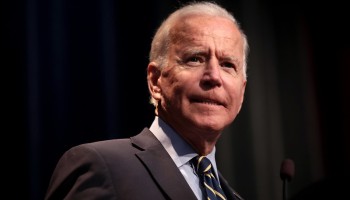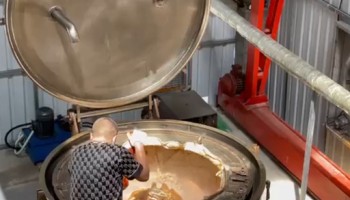Reported by
The small Baltic nation of Lithuania isn’t usually thought of as a hub of cocaine trafficking.
But in December, the U.S. government announced it was taking “sweeping action” against the global drug trade by imposing sanctions on five Lithuanians they accused of coordinating a massive drug smuggling ring that spanned three continents.
What exactly were these Lithuanians doing?
The U.S. sanctions notice doesn’t go into detail, but journalists at OCCRP and its Lithuanian partner, Siena.lt, had already been looking into the same men, after learning that authorities in both Australia and Colombia suspected them of coordinating drug shipments.
One of them, Rokas Karpis, is well-known in Lithuania from a previous foray into crime, when he was arrested in New Zealand for drug smuggling, then dramatically fled the country in 2001 using a false identity while out on bail.
Karpis, who at the time of his arrest was known as Rokas Karpavičius, is the son of a prominent Lithuanian businessman. He remained free for a decade, but was recaptured in Latvia in 2011 and extradited to New Zealand. During his trial, local media dubbed him the “global kingpin” of a drug trafficking and money laundering syndicate.
He was sentenced to more than 11 years in prison, but paroled in 2016 and deported back to Lithuania. In recent years he has kept a low profile, claiming to have reinvented himself as a currency trader. He also changed his name to Rokas Karpis.
But last year, OCCRP journalists learned that law enforcement suspected the “global kingpin” might have continued trafficking drugs even after his release from prison.
A memo found within the NarcoFiles, a leak of emails from the Colombian prosecutor’s office, alleged that a group co-led by Karpis had been behind a major 2017 cocaine seizure on a sailboat called the Afalina.
The memo, compiled by Colombian investigators but largely based on police intelligence from Australia, came from an international law enforcement collaboration involving six countries, codenamed Operation Edge-Dale, which was set up after the Afalina’s seizure. It describes a “Lithuanian drug trafficking organization” which it alleged was co-headed by Karpis.
The memo also claimed that Karpis was working with another Lithuanian, Virginijus Labutis, to run the smuggling operation. However, neither man was charged in connection with the Afalina seizure, and these suspicions never saw the light of day.
Unlike Karpis, Labutis is not widely known in Lithuania. But he was arrested in September in Colombia and extradited back to his home country after an Interpol warrant was requested by Lithuania on allegations of cocaine trafficking.
Three months later, the U.S. sanctioned him, alongside Karpis, for allegedly coordinating international drug shipments and working with major organized crime groups, including Mexico’s Sinaloa Cartel.
Karpis’ lawyer declined to comment, while Labutis is in detention in Lithuania and unavailable for comment. Karpis’s current whereabouts are unknown, although the U.S. sanctions notice said he was based in Spain.

Rokas Karpis, pictured handcuffed outside Auckland Airport in October 2012, was extradited to New Zealand for drug and money laundering charges after a year in a Latvian prison following his arrest on an Interpol warrant.
The new revelations about Karpis and Labutis raise the possibility that Lithuanians might be taking on a new, more active role in international drug trafficking, according to Mindaugas Lankauskas, a Lithuanian criminologist from Vilnius University.
“Lithuanians usually occupy logistical positions. That means they can move [cocaine] shipments, they might be buying some quantities, but they aren’t usually at the top of the chain,” Lankauskas said.
The December sanctions showed that Karpis’s and Labutis’ alleged operations were “serious enough” for the U.S. to act, he added.
Lithuanian police confirmed their participation in Operation Edge-Dale, and echoed Lankauskas’s analysis.
“The [U.S.] sanctions applied to these individuals show the scale of their crimes and the danger they pose," said the Lithuanian Criminal Police Bureau in a statement to Siena.
The chief of the bureau, Arūnas Maskoliūnas, told reporters that Karpis was “known” to law enforcement, but said he could not comment on early stage investigations.
'Global Kingpin' Limited
After being deported from New Zealand and changing his name, Karpis appeared to turn over a new leaf and settle down as a businessman.
He set up new companies, including a Swiss firm that operated an ultra-secure encrypted messaging app called Kraden, and a U.K. company he named Global Kingpin (IP Holdco) Limited.
But although Global Kingpin declared its purpose to U.K. authorities as “publishing video games,” there are no indications that it ever did. Reporters could not find any video games published by Global Kingpin, and the company did not file financial statements. And its co-owner was a man with a criminal history similar to Karpis’ own: David Thackray, an Australian drug trafficker who was arrested in New Zealand in 2014 after a mule was caught in Auckland airport attempting to smuggle a kilogram of cocaine in a travel pillow.
Thackray was sentenced to 12 years in prison, but released on parole in February 2018, a few months before Global Kingpin was set up. (He could not be reached for comment.) The U.S. Treasury also sanctioned Thackray in its December 2024 notice targeting drug traffickers.
Global Kingpin was dissolved in 2019, and a company representative could not be reached for comment about its activities.
U.S. authorities alleged in their 2024 sanctions notice that Karpis’s encrypted messaging app Kraden had been used by drug traffickers, and blacklisted its parent company along with a Lithuanian man who had helped run it.
Karpis did not respond to requests for comment about his business interests sent via his lawyer.
A Reference to Karpis in Another New Zealand Drug Case
'The Millionaire’s Testament'
There is also evidence that Karpis has had a relationship with Labutis, the Lithuanian accused drug smuggler, over the past several years.
When Karpis’s millionaire father passed away in 2019, his family and business associates began jockeying for control of the assets he left behind. The battle made national headlines, and Lithuanian journalist Dailius Dargis published a book about Karpis and his father, “The Millionaire’s Testament in the Trap of Love,” in 2023.
In the book, Dargis wrote that a longtime friend of Karpis realized in 2020 that he was being surveilled by Lithuanian police. Karpis filed a legal complaint over his friend’s surveillance 2023 that was eventually dismissed, but the prosecutor in the case told reporters from Siena that the friend was Labutis. (The Vilnius district court, which dismissed the claim, refused to provide a copy of the ruling to reporters, saying that the case was connected to an ongoing investigation led by Lithuania’s prosecutor general.)
Meanwhile, in the battle for control over the Karpis family companies, Karpis temporarily succeeded in 2022 in removing his relatives from running UAB Karpis, a key holding company in his late father’s business empire.
A court-appointed administrator was appointed, but court files show that Karpis was allowed to recommend who the court appointed. The administrator ended up replacing the entire board of UAB Karpis — and appointing Labutis’s sister, Asta Daminaitė, to sit on it, along with a former business partner of Labutis. She went on to become the company’s president.
The court-appointed administrator, Egidijus Langys, denied that he was acting in Karpis’s interests when Daminaitė was appointed to the company’s board .
Daminaitė told Siena she had never met Karpis. She said she was aware of her brother’s arrest in Colombia and hoped that “the investigation will be finished in the shortest possible time.”
Laima Gerasičkinienė, Karpis’ lawyer, said she was not authorized to “mediate in the client’s relations with journalists,” so could not forward questions to Karpis.
Siena also sent written requests for comment to Karpis’ addresses in Lithuania, which went unanswered.
The Third Lithuanian
The drug shipment Karpis and Labutis were accused of coordinating in the Colombian memo was seized by the French navy in July 2017 as it crossed the Pacific from South America in the sailboat Afalina, heading toward Australia with a crew of three Lithuanians and a Latvian. The vessel was carrying almost 1.5 tons of cocaine.
The leaked intelligence memo from Operation Edge-Dale also claims that Saulius Staškus, another of the Lithuanian men sanctioned by the U.S. in December, oversaw the Afalina’s crew.
This matches testimony from the crew themselves after they were put on trial in New Caledonia, a semi-autonomous French territory, and sentenced to jail for drug trafficking. Documents from the trial, obtained by OCCRP, show that the crew members all testified to having dealt with Staškus.
Staškus denied the allegations, telling reporters from Siena that he was not involved with the Afalina or its crew and had no affiliation with Karpis or Labutis.
A Second Shipment?
Staškus’s name was also cited in a separate cocaine trafficking case in Argentina in 2020, in which two Lithuanians were found guilty. Testimony from that court case claims the same Afalina sailboat was used at least once to enter Argentina in 2015, and that Staškus was one of two crew members on board.
There is no record that Staškus was charged with any crime in the case. Staškus told reporters he knew some of the Lithuanians named in the ruling, including the person who allegedly travelled to Argentina on board the Afalina, but claimed he had never sailed with him.
Operation Edge-Dale seems to have wound down without direct results. The 2021 memo claims that the crime group’s plan to transport another two tons of cocaine were interrupted by the Covid-19 pandemic and global restrictions on marine traffic, leading to them “selling the ships.” The case is listed as inactive on the Colombian prosecutor’s website. Questions to the prosecutor’s office about the status of the case went unanswered.
Jean-Alexis Gallien-Lamarche, Miglė Krancevičiūtė (Siena.lt), and Sophia Stahl (Paper Trail Media) contributed reporting.






